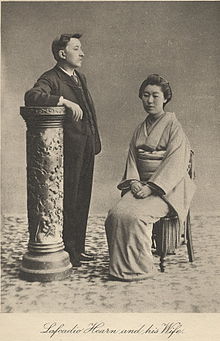This articleneeds additional citations forverification.(July 2024) |
Japanophiliais a strong interest in Japanese culture, people, and history.[1]In Japanese, the term for Japanophile is "shinnichi"(Thân nhật),with "shin(Thân)"equivalent to the English prefix 'pro-' and"nichi(Nhật)",meaning" Japan "(as in the word for Japan" Nippon/Nihon "(Nhật bổn)). The term was first used as early as the 18th century, switching in scope over time. Its opposite isJapanophobia.The study of Japan isJapanology.

History
editThe term "Japanophile" originated in the late 18th and early 19th centuries during Japan's period ofsakoku,when contact with foreign countries was strictly limited.Carl Peter ThunbergandPhilipp Franz von Sieboldhelped introduce Japanese flora, artworks, and other objects to Europe which spiked interest.[2][3]Lafcadio Hearn,an Irish-Greek author who made his home in Japan in the 19th century, was described as "a confirmed Japanophile" byCharles E. Tuttle Companyin their forewords to several of his books.[4]Others may includeJules Brunet,aFrench Armyofficer who played a famous role in the JapaneseBoshin War.[citation needed]
20th century
editIn the first decade of the 20th century, several British writers lauded Japan. In 1904, for example,Beatrice Webbwrote that Japan was a "rising star of human self-control and enlightenment", praising the "innovating collectivism" of the Japanese, and the "uncanny" purposefulness and open-mindedness of its "enlightened professional elite."H. G. Wellssimilarly named the élite of hisA Modern Utopia"samurai". In part, this was a result of the decline of British industrial productivity, with Japan and Germany rising comparatively. Germany was seen as a threat and a rival power, but Japan was seen as a potential ally. The British sought efficiency as the solution to issues of productivity, and after the publication ofAlfred Stead's 1906 bookGreat Japan: A Study of National Efficiency,pundits in Britain looked to Japan for lessons. This interest, however, ended afterWorld War I.[5]
GeneralJosé Millán-Astray,the founder of theSpanish Legion,stated that thesamuraiwarrior codeBushidoexerted a great influence on him. Defining Bushido as "a perfect creed", Millán-Astray said that "the Spanish legionnaire is also a samurai and practices the Bushido essentials: Honor, Valor, Loyalty, Generosity, and Sacrifice", and added thatSpainwould become a great power like Japan by adhering to the code's principles.[6]He also made a Spanish translation ofInazo Nitobe's bookBushido: The Soul of Japanand a prologue to it.[7]
21st century
editIn the early 2000s, derogatory slang terms were created to refer to people who are obsessed withJapanese popular culture.The term "wapanese" (from "white Japanese", or possibly also "wannabe Japanese" ) first emerged in 2002 as a derogatory term for a non-Japanese, particularly white, person who is obsessed with Japanese culture, particularlyanime,manga,visual novelsandlight novels.The term "weeaboo"(often shortened to"weeb") came from the webcomicThe Perry Bible Fellowship,in which the word had no meaning other than something unpleasant.[8]An administrator on4chanadded a filter on the site to change "wapanese" to "weeaboo," but users on the site quickly picked up the word and applied it in an abusive way in place of the already existing term "wapanese".[9][10]The terms "weeaboo" and "weeb", while originally derogatory, have also beenreclaimedby some of those to whom they originally referred, seeing increased usage by fans of Japanese media to refer to themselves in an ironic or self-deprecating fashion.[11]
Kim Morrissy of the media companyCrunchyrollwrote that the use of the wordotaku(person with consuming interests) in anime fandom can be hindered by the belief of someWesternersthat its use constitutescultural appropriationand that it can only refer to a Japanese person.[12]
In a blog post onAnime News Network,Justin Sevakis argued that there is a difference between a weeaboo and someone who simply appreciates Japanese culture, saying that there is nothing wrong with loving Japanese culture, but that a person becomes a weeaboo when they start to be obnoxious, immature, and ignorant about the culture they love.[13]Matt Jardin from theAlaska Dispatchgave his opinion that weeaboos blindly prefer things from Japan while looking down on anything else, despite obvious merit.[14]
See also
edit- Japanization
- Japanification– The process of becoming or wishing to become a member of Japanese society
- Japonisme
- Orientalism
- List of Westerners who visited Japan before 1868
- Japanese studies
- Cool Japan
- Japan Expo
- Anime club
- Pacific Movement of the Eastern World
- Sinophile
- Jingri
References
edit- ^"Japanophile".Webster's Third New International Dictionary, Unabridged.Merriam-Webster. 200.Archivedfrom the original on 10 February 2013.Retrieved21 February2016.
one who especially admires and likes Japan or Japanese ways
- ^William R. Johnston (1999).William and Henry Walters, the Reticent Collectors.JHU Press. p. 76.ISBN0-8018-6040-7.
- ^Robin D. Gill (2004).Topsy-Turvy 1585.Paraverse Press. p. 25.ISBN0-9742618-1-5.
- ^Hale, Heather (September 1990)."Lafcadio Hearn".Japanfile, the Website ofKansai Time OutMagazine.Archived fromthe originalon 5 March 2016.
- ^Bruce Cumings (1999). "Archaeology, Descent, Emergence: American Mythology and East Asian Reality".Parallax Visions: Making Sense of American-East Asian Relations.Duke University Press. p. 25.ISBN0-8223-2924-7.
- ^Jensen, Geoffrey (2002).Irrational Triumph: Cultural Despair, Military Nationalism, and the Ideological Origins of Franco's Spain.Reno, Nevada:University of Nevada Press.p. 150.ISBN0874174813.[permanent dead link]
- ^Beeby, Allison; Rodríguez, María Teresa (2009)."Millán-Astray's Translation of Nitobe's Bushido: The Soul of Japan"(PDF).Autonomous University of Barcelona.Archived(PDF)from the original on 6 July 2017.Retrieved6 June2017.
- ^Chris Kincaid (30 August 2015)."Am I a Weeaboo? What does Weeaboo Mean Anyway?".Japan Powered.Archivedfrom the original on 30 August 2015.Retrieved21 February2016.
- ^Stryker, Cole (1 September 2011).Epic Win for Anonymous: How 4chan's Army Conquered the Web.Abrams. p. 37.ISBN978-1-59020-738-3.
- ^Davis, Jesse Christian."Japanese animation in America and its fans"(PDF).Archived(PDF)from the original on 4 March 2016.Retrieved12 December2015.
- ^Ewens, Hannah (18 July 2017)."We Asked J-Culture Fans to Defend Being 'Weeaboos'".VICE.Retrieved5 October2024.
- ^Morrissy, Kim (22 August 2016)."Feature: Found in Translation - The Evolution of the Word 'Otaku' [Part 1]".Crunchyroll.Archivedfrom the original on 24 August 2016.Retrieved26 August2016.
- ^Justin Sevakis (22 August 2014)."Nobody Loves the Weeaboo".Anime News Network.Archivedfrom the original on 24 August 2014.Retrieved10 March2016.
- ^Matt Jardin (29 September 2016)."Going to Senshi Con this weekend? Here are 5 terms to know".Alaska Dispatch.Archivedfrom the original on 1 October 2016.Retrieved18 May2017.